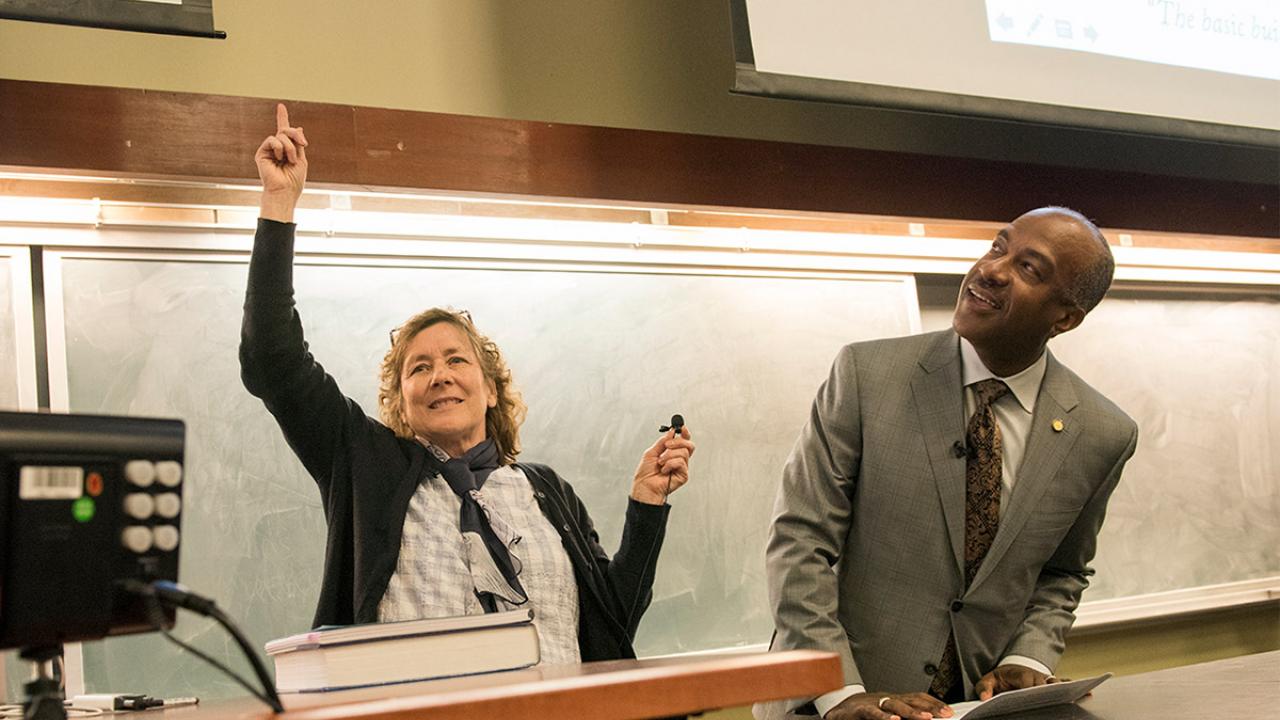For Judy Callis, teaching is about helping students make connections, between the biochemistry they learn in her lectures, what they have learned in other classes and their own life experiences.
“I get excited about teaching because I like to excite people about the subject matter — I love it when principles and concepts click with students and all of a sudden they understand something they’ve struggled with,” she said.
Today (April 3) those connections led to Callis, professor and vice chair of the Department of Molecular and Cellular Biology in the College of Biological Sciences, being awarded the UC Davis Prize for Undergraduate Teaching and Scholarly Achievement. The $45,000 prize is funded by gifts managed by the UC Davis Foundation.
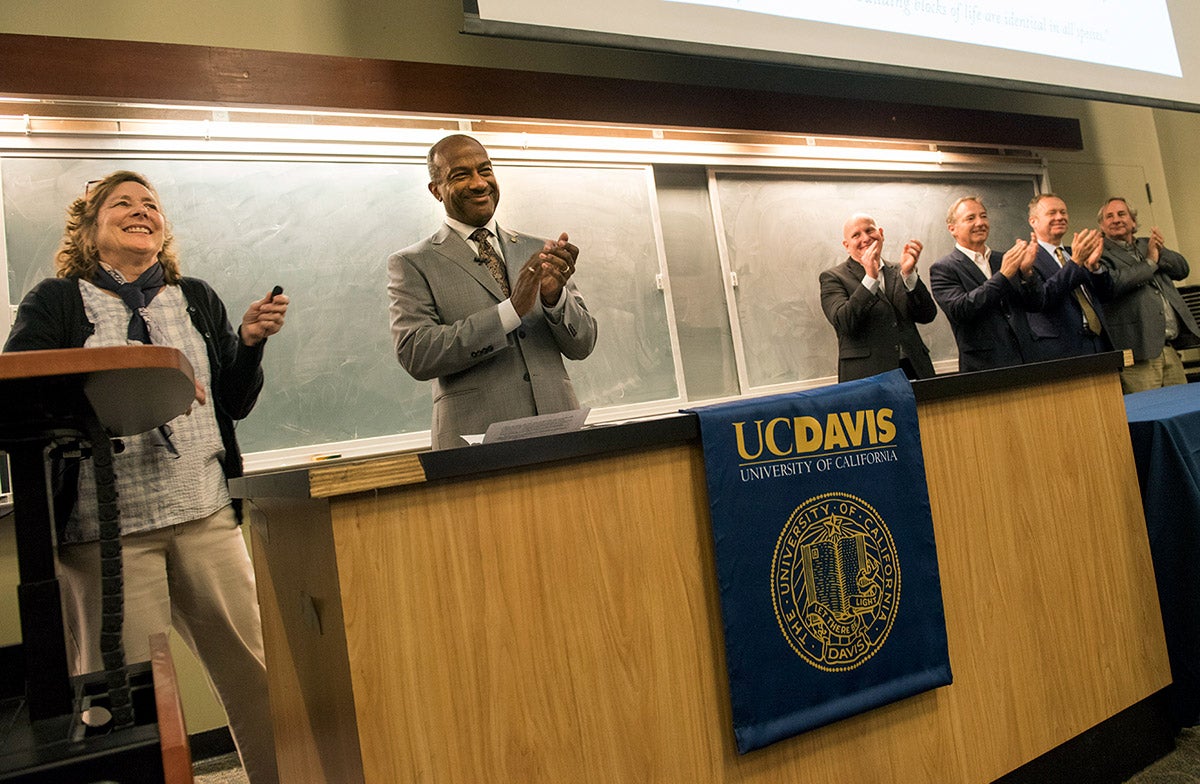
“Professor Callis has that rare ability to bring out the very best in her students and to inspire them to go beyond what they previously thought were their limits. As an instructor, she is uncommonly connected with her students, guiding their thought processes and inspiring confidence in their academic abilities,” said Mark Winey, dean of the College of Biological Sciences.
Callis has been teaching biochemistry at UC Davis, including various incarnations of BIS 103, a major lower-division course in biochemistry, since joining the faculty in 1989. She cited colleagues in the Department of Molecular and Cellular Biology, especially the late Eric Conn, who died in September 2017, and J. Clark Lagarias, as influencing her teaching style.
“I learned from them respect for students and for the learning process,” she said. “Students are partners in the learning process and it’s our responsibility to guide them in that path. It’s very much the culture of our department.”
Grasping principles and concepts
BIS 103 is part of a series of classes taken by all undergraduates in the College of Biological Sciences and many other students as well. With up to 350 students at a time, it’s stuffed with complex biochemical pathways that students can find daunting. To overcome this, Callis encourages students to look at the functions of pathways, how they connect to other pathways and how these relate to their everyday experiences.
“Like eating sugar, what’s the big deal about fructose? Thinking about things that they eat or about how they exercise at a biochemical level, I think that’s really fun,” she said. “I want them to focus on common principles and concepts so that they can make predictions based on what they know.”
Students praise her approach in their evaluations.
“Her reader for the class is not only packed with information but greatly appreciated by the students. It is a way for students to focus on explanations rather than chemical structures,” wrote one student.
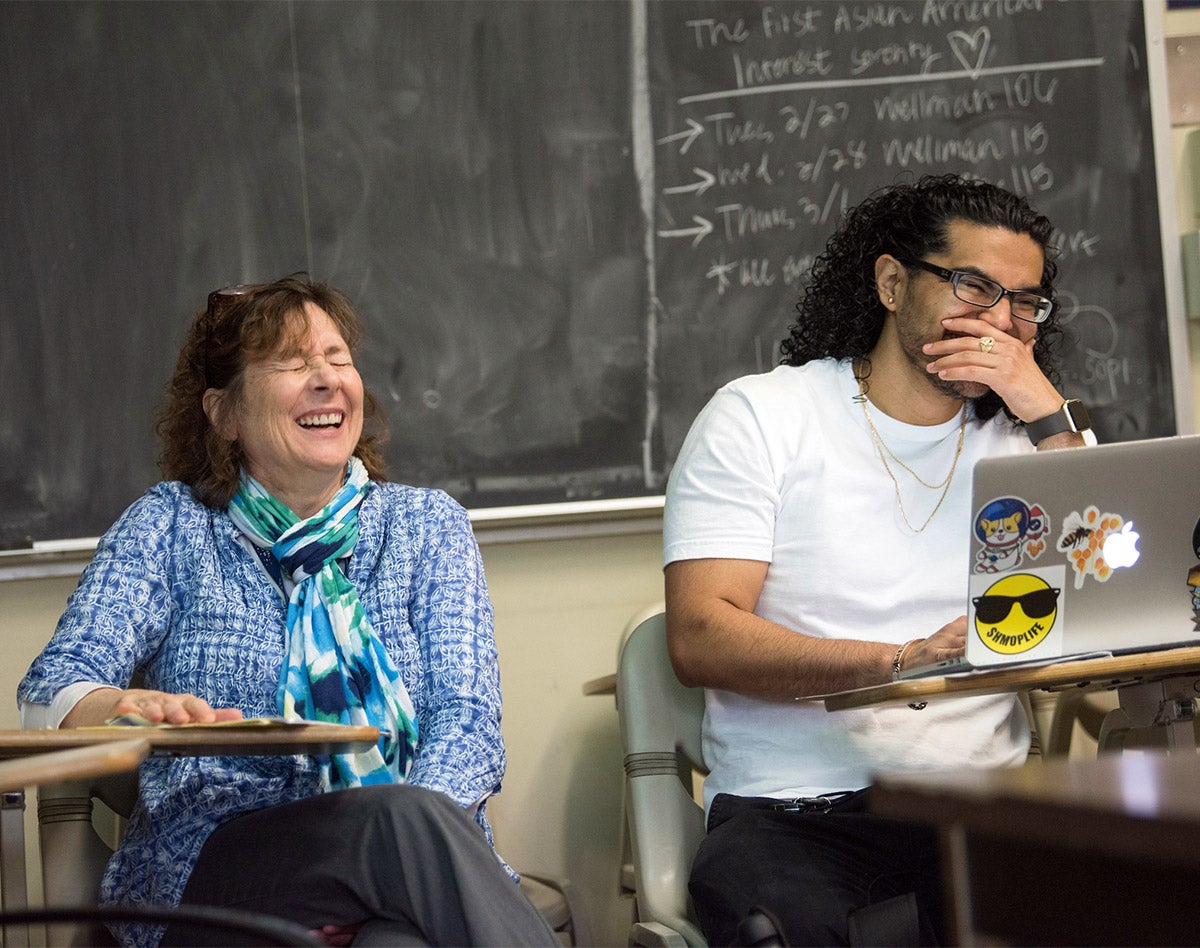
It’s like trying to read Don Quixote in Spanish, Callis said. Learning a bit of Spanish will help you read the novel; reading the novel helps you learn more Spanish.
“It’s the same with biochemistry, there’s a certain vocabulary and once you learn it you can have fun with it,” she said.
In fact, Callis started as a languages major — although in Russian, not Spanish, at Macalester College in St. Paul, Minnesota. But an introductory course in biology drew her into science instead.
“It was unusual in that we spent a lot of time thinking about how to do science, how do we ask questions, how do we solve problems, rather than memorizing information,” she said. “I liked it a lot and it made me very interested in doing science.”
Callis transferred to Washington University in St. Louis, where she worked in a plant biology laboratory and graduated with a bachelor’s degree in biology. She then worked as a lab technician at the University of Wisconsin-Madison before taking a master’s in botany from the University of Illinois at Urbana-Champaign. By that time, her undergraduate mentor, Virginia Walbot, had moved to Stanford University and invited Callis to come west to study for her Ph.D.
“I think she was very important as a mentor, because she had confidence that I would be successful and figure it out, she let you have as much independence as you wanted,” Callis said.
It was when Callis finished her doctorate and returned to Rick Vierstra’s lab at UW Madison for postdoctoral research that she started working on ubiquitin, which has occupied her for the past 31 years.
Cellular garbage disposal
Discovered by Gideon Goldstein in 1975, ubiquitin is so named because it is everywhere. The small protein is found in almost all tissues in animals, plants and fungi.
Initially, ubiquitin seemed to be a cellular “sale sticker,” Callis said. It’s attached to proteins that are due to be hauled away for disposal within the cell. But it turns out that ubiquitin does far more than tag items for destruction. It is selective, tagging some items but not others. It can attach in different ways and form chains that tag proteins for different pathways. Rather than a sales sticker, it is more like a programmable RFID tag attached to a parcel in a warehouse and directing it where to go.
“Originally people thought that ubiquitin was there to take out the garbage, and I thought that was interesting, the specificity of it,” Callis said. “But it turns out to be way more complex than we originally thought.”
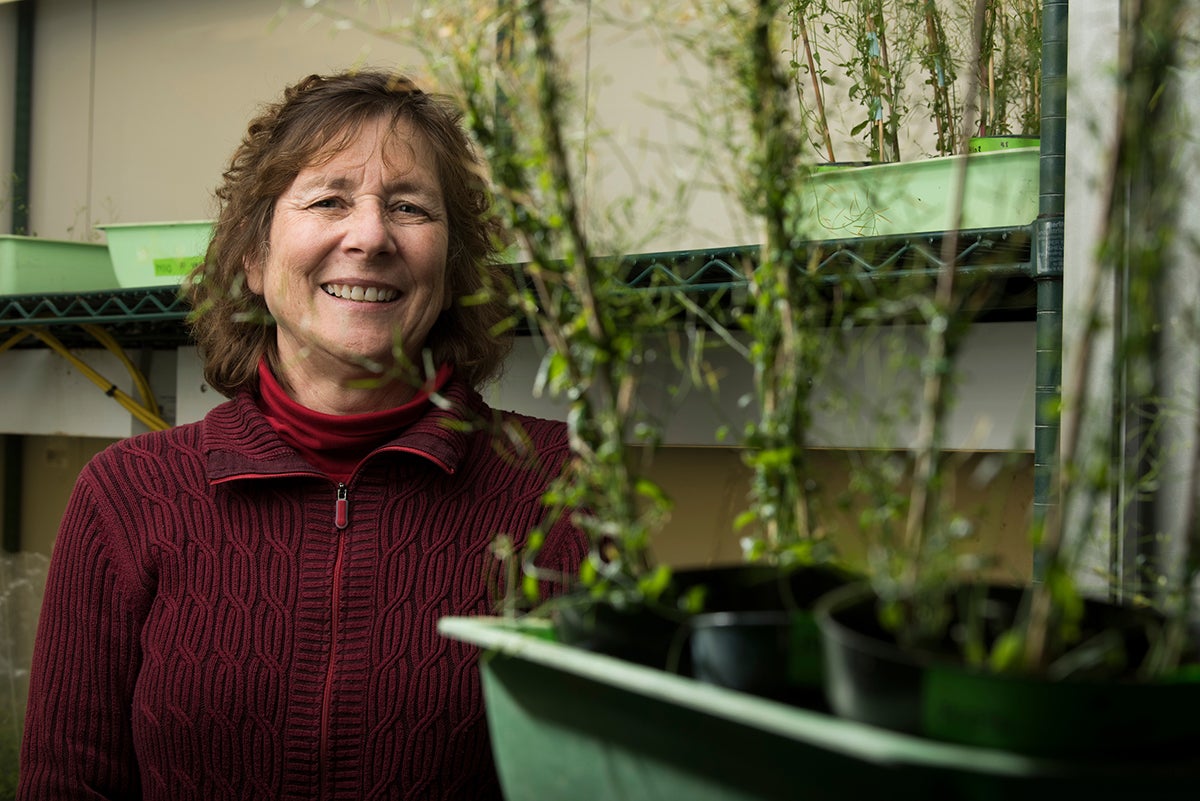
The 2004 Nobel Prize in chemistry was awarded to Avram Hershko, Aaron Ciechanover and Irwin Rose for discovering the ubiquitin protein degradation system.
Callis studies ubiquitin pathways using the model plant Arabidopsis. More than 10 percent of the genes in this small plant are related to ubiquitin, adding to or removing it from proteins and creating or reading what is now called the “ubiquitin code,” she said.
Ubiquitin is particularly important in shaping plant growth, she said. It regulates the “master regulators” that control how cells respond to hormones such as auxin that shape how stems, roots, leaves and flowers grow.
“Professor Callis is the leader in understanding how these hormones regulate protein degradation,” wrote Jodi Nunnari and Joanne Engebrecht, chair and vice-chair, respectively, of the Department of Molecular and Cellular Biology, in nominating Callis for the award. Her work has been instrumental in elucidating the players in ubiquitin pathways, they wrote, leading to many unexpected discoveries and opening up new fields of study.
“It turns out that what we thought was a very narrow process is involved in everything,” Callis said.
Encouraging classroom engagement
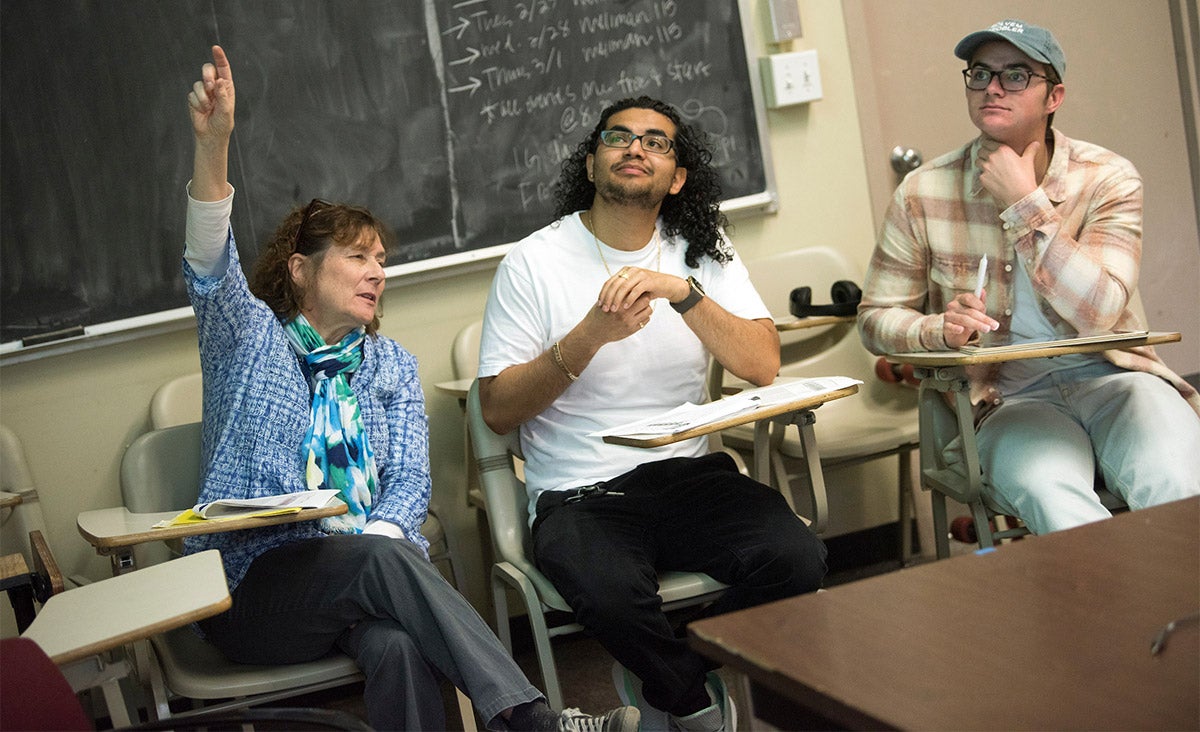
Reviews of Callis’ teaching describe her as an exemplary, dedicated and hard-working instructor who creates a respectful classroom climate that encourages engagement, Nunnari and Engebrecht wrote.
In addition to BIS 103, Callis also teaches smaller classes, including a seminar in biochemistry. With a group of less than 20 students, she explores a topic from beginning to end. This winter quarter, the class learned about the “tumor suppressor” gene P53 from its discovery in 1979 to clinical applications. P53 is, naturally, regulated by ubiquitin and is the focus of human clinical trials for a range of cancers.
Among professional service, Callis served as editor of The Plant Cell, the world’s leading journal in plant cell biology, from 2009 to 2014, and is currently an editor for Faculty of 1000, an online scientific forum. She has served on numerous review panels and boards for the National Science Foundation, other agencies and professional societies. She is a fellow of the American Association for the Advancement of Science and the American Society of Plant Biologists and served on the AAAS Council from 2013 to 2016.
At UC Davis she held the College of Biological Sciences’ rotating Paul K. and Ruth R. Stumpf Chair in Plant Biochemistry from 2005 to 2011.
Callis has also regularly appeared as a guest lecturer in local high schools and sponsored a number of students in the Davis Senior High School Biotechnology Program.
UC Davis has been a great place to work, Callis said.
“I’m in a department with people who work on different kinds of systems like yeast or zebrafish, but in addition I have the whole plant biology community and I get to know them through graduate programs and research affiliations, and it’s an outstanding community,” she said. “People are collegial, they’re not cutthroat competitive.”
After almost 30 years, Callis said she still enjoys teaching a large lecture class.
“I feel like it’s important that they get a good experience at that level, because I can influence what major they decide to go to at that point,” she said. “I think about the impact that introductory bio class had on me.”
About the undergraduate teaching prize
Established in 1986, the UC Davis Prize for Undergraduate Teaching and Scholarly Achievement was created to honor faculty who are both exceptional teachers and scholars. The $45,000 prize is funded through philanthropic gifts managed by the UC Davis Foundation. The winner is selected based on the nominations of other professors, other research peers, and representatives of the UC Davis Foundation board of trustees, as well as from students. See a list of all the recipients since the award’s inception.
Audio: Plant Biochemist is UC Davis' Top Teacher
Media Resources
Andy Fell, UC Davis News and Media Relations, 530-752-4533, ahfell@ucdavis.edu
Judy Callis, UC Davis Molecular and Cellular Biology, 530 752 1015, jcallis@ucdavis.edu
